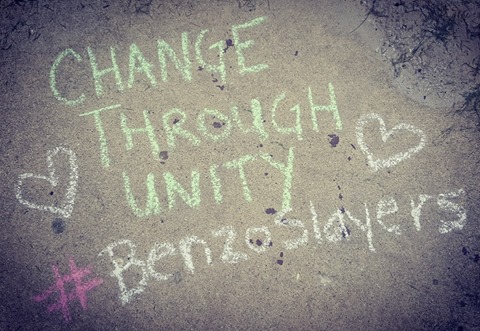On this page you can learn about why World Benzodiazepine Awareness Day (W-BAD) has become necessary.
WHY HAS W-BAD BECOME NECESSARY?
W-BAD’s Founder, Wayne Douglas, says that his motivation for establishing World Benzodiazepine Awareness Day came after his benzodiazepine litigation case in the Japanese courts, when he went online to see if others had been going through similar experiences.
What he came across shocked him – masses of people crying out in the dark without any help or understanding, desperate people – some of them committing suicide, but most notably, it was all happening in closed groups and it was all happening behind closed doors.
It was then that he thought to himself, these people need a voice and they need help – how is the problem ever gong to improve, if everything is left behind closed doors…?
It was for that reason, he felt a need to do something, but that certain something eluded him until one day on November 5, 2015, when Barry Haslam suggested the idea of having an international day, which was the moment when the “why” and the “how” came together.
World Benzodiazepine Awareness Day (W-BAD) also promotes unification of the grassroots and localized campaigning efforts made by many activists over the decades to help bring attention to the need of specialized support centers, regulations and warnings for benzodiazepine drugs, as well as to raise awareness and to provide education about the sometimes devastating outcomes that can result from long-term prescribed benzodiazepines. Instead of these efforts remaining insular, W-BAD provides a more inclusive platform to help highlight that this is truly a global issue that warrants worldwide attention and concern. Individual action does matter, but…
“It is not in numbers, but in unity, that our greatest strength lies.” – Thomas Paine

W-BAD was also created to provide the victims of iatrogenic benzodiazepine dependence, withdrawal and damage an event in which they can ‘come out’ from the shadows (where they are often left feeling ignored, shunned, disbelieved and unsupported) instead, feeling unity and solidarity, affecting change with a unified front. The day highlights the camaraderie, friendship and purpose found within the support group communities around the world. Whenever one person stands up and says “this is wrong” or “this happened to me,” it helps other people to do the same.
Finally, W-BAD was created to honor Dr. C. Heather Ashton, author of The Ashton Manual and a significant contributor to several years worth of dedicated benzodiazepine clinical research, on her birthday (July 11th) for her lifelong dedication to the benzodiazepine cause.
WHY DO WE NEED THIS AWARENESS?
Because…
- A lot of people take Benzodiazepines (BZDs)—they are the most widely prescribed drugs in the world.
- There is no government help or recognition.
- BZDs are making some people very sick.
- BZD withdrawal can be severe, long lasting, and even fatal.
- There are almost no specialized support services for these patients and they feel like they cannot get help.
- It’s not an addiction issue (but is often misconstrued as one, taking the focus off the real problem—misprescribing—and, instead, attempting to lay blame on compliant patients)
- You can have withdrawal symptoms from BZDs even if you aren’t decreasing your dose (tolerance withdrawal and interdose withdrawal).
- BZDs sicken people who take these drugs exactly as prescribed.
- Existing research on problems with BZDs has been suppressed, censored and marginalized—and there needs to be more performed to truly understand the scope and nature of the problem.
- Even comparatively ‘low’ doses of BZDs can lead to severe physical dependence and withdrawal.
- The protracted withdrawal syndrome (PWS) may persist for months to years after cessation of BZDs and can be life-devastating.
- BZDs can lead to extraordinary financial ruin.
- BZDs can damage or even destroy relationships.
- BZDs are associated with high socioeconomic costs.
- BZDs lose their effectiveness quickly over time (but are still prescribed long-term, in spite of this).
- BZDs can cause or worsen anxiety (in spite of often being prescribed to ‘treat’ anxiety. This makes no logical sense).
- BZDs can lead to suicidal thoughts, behaviors, and sometimes completion.
- Long-term use of BZDs can worsen or complicate pre-existing physical and mental health problems.
- Not enough medical professionals have awareness or education about this problem.
- Not enough people have awareness in general.
- Friends and family of BZD sufferers should have access to information to help them understand what their loved ones in BZD withdrawal are experiencing.
- Serious concerns about BZDs have been documented in westernized medical literature for over 50 years, yet people are still getting sick and nothing has changed.
- Many people who are sickened by a BZD may not know it’s their BZD causing illness, and their doctor, if not educated, may fail to recognize it too.
- BZD dependence can cause panic disorder in people who have never had panic disorder before.
- BZDs are associated with an increased risk for dementia and other health problems.
- Dependence on BZDs can lead to inappropriate diagnoses/treatments.
- BZD adverse reactions may mimic (and is often misdiagnosed as) other serious health conditions.
- People may have an awareness that BZDs are addictive, but they may not have an awareness that they can sustain injury from a BZD without ever abusing it.
- In the US, BZDs are currently classified as Schedule IV drugs (Defined as: “Abuse of the drug or other substance may lead to limited physical dependence or psychological dependence relative to the drugs or other substances in schedule III”) when they cause physical dependence without abuse history and when the physical dependence is not ‘limited’ at all, but rather often severe.
- Regulations are lacking.
- Too many prescribers are ignoring prescribing guidelines.
- Many prescribers are not giving informed consent, which is unethical.
- Many prescribers are not allowing some physically dependent patients to taper properly.
- What has happened (and is happening) is inhumane and a human rights violation.
The following video briefly explains the crux of the benzodiazepine problem and why, exactly, there is a need for World Benzodiazepine Awareness Day (W-BAD): (4:46)
ADDITIONAL INFORMATION
Visit this page for more information regarding the “why”
